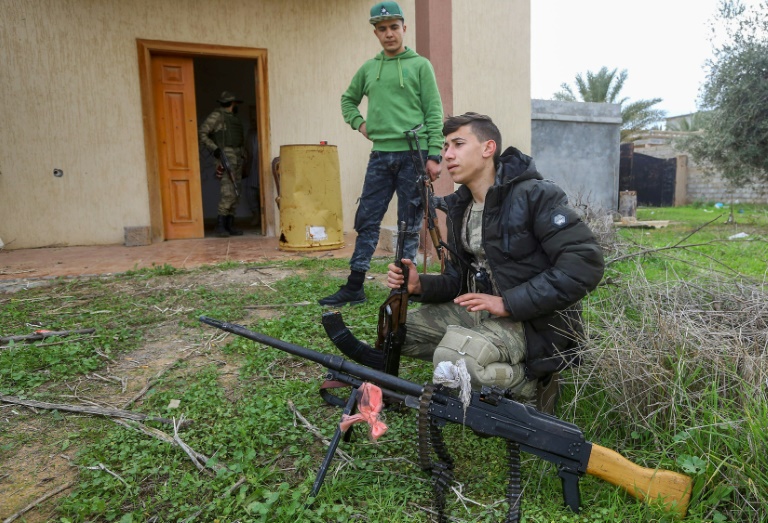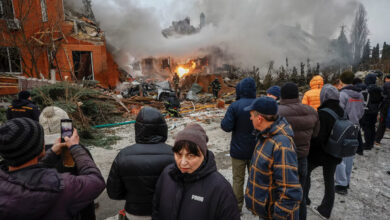
World leaders will gather in Berlin on Sunday to make a fresh push for peace in Libya, in a desperate bid to stop the conflict-wracked nation from disintegrating into a “second Syria”.
The presidents of Russia, Turkey and France are due for talks from around 2:00 pm (1300 GMT) held under the auspices of the United Nations, which wants to get foreign powers wielding influence in the region to stop interfering in the war, through the provision of weapons, troops or financing.
Leaders of both warring factions — strongman Khalifa Haftar and the head of Tripoli’s UN-recognized government Fayez al-Sarraj — are also expected at the first such gathering since 2018.
But hours ahead of the meet, pro-Haftar forces upped the ante by blocking oil exports at the war-ravaged country’s key ports, crippling the main source of income in a protest against Turkey’s decision to send troops to shore up Sarraj’s Tripoli-based Government of National Accord (GNA).
The move underlined the devastating impact of what is described by the UN as foreign interference, which the United Nations’ special envoy Ghassan Salame said had to stop.
“All foreign interference can provide some aspirin effect in the short term, but Libya needs all foreign interference to stop. That’s one of the objectives of this conference,” he told AFP on the eve of the meeting.
The UN hopes all sides will sign up to a plan to refrain from interference, and commit to a truce that leads to a lasting end to hostilities, according to a draft of a final communique seen by AFP.
That document also urges all parties to re-commit to a much-violated UN arms embargo and raises the prospect of political, inter-Libyan talks in Geneva at the end of the month.
If all goes to plan, the Berlin participants will hold an evening press conference.
– ‘Second Syria’ –
Libya has been torn by fighting between rival armed factions since a 2011 NATO-backed uprising killed dictator Moamer Kadhafi.
Most recently, Sarraj’s troops in Tripoli have been under attack since April from Haftar’s forces.
Clashes killed more than 280 civilians and 2,000 fighters and displaced tens of thousands, until a fragile ceasefire backed by both Ankara and Moscow was put in place on January 12.
Although Sarraj’s government is recognized by the UN, powerful players have broken away to stand behind Haftar — turning a domestic conflict into what is essentially a proxy war in which international powers jostle to secure their own interests.
Alarm grew internationally as Turkish President Recep Tayyip Erdogan ordered troops to Libya early January to bolster Sarraj.
Underlining the stakes involved, German Foreign Minister Heiko Maas said “Europe and those players who are influential” in the region have all been called to Berlin, because “we have to make sure Libya doesn’t become a second Syria.”
“The conference can be the first step to peace for Libya,” Maas told the Bild newspaper.
Sarraj meanwhile issued a call for international “protection troops” if Haftar were to keep up his offensive.
“Such a protection force must operate under the auspices of the United Nations. Experts will have to advise who should participate, such as the EU or the African Union or the Arab League”, he told Die Welt newspaper on Sunday.
He also criticized the EU, saying it had not been proactive enough on Libya.
“Unfortunately the role of the EU so far has been very modest… even though some EU countries have a special relationship with Libya, we are neighbors and have many interests in common,” he said.
– Lip service? –
On the eve of the Berlin talks, Turkey’s Erdogan warned Europe to stand united behind Sarraj’s government, as Tripoli’s fall could leave “fertile ground” for jihadist groups like the Islamic State group or Al-Qaeda “to get back on their feet”.
Erdogan also played up Europe’s fears of a repeat of the 2015 refugee crisis. In a commentary for Politico news website, he warned that further unrest could prompt a new wave of migrants to head for the continent.
Accusing France in particular of siding with Haftar, Erdogan said leaving Libya to the commander would be a “mistake of historic proportions”.
France has denied it was backing Haftar.
For Turkey, a fall of Sarraj’s GNA could jeopardise a maritime boundary agreement the parties signed. It gives Ankara extensive rights over the eastern Mediterranean where the recent discovery of undersea gas reserves has triggered a scramble by littoral states.
But Haftar is backed by Turkey’s fiercest regional rivals — Egypt, Saudi Arabia and the United Arab Emirates.
Erdogan has also accused Russia of sending in mercenaries to help Haftar, as Moscow seeks to extend its influence in the region.
Meanwhile, the European Union is watching with growing alarm at the escalating strife on its doorstep as it uses Libya as a gatekeeper deterring migrants from crossing the Mediterranean.
The International Crisis Group’s Libya expert Claudia Gazzini said the Berlin conference “could be a modest step forward” on the path to peace.
“Yet the risk remains that some participants will merely pay lip service to the diplomatic initiative, even as they continue to fuel a war from which they benefit.”




